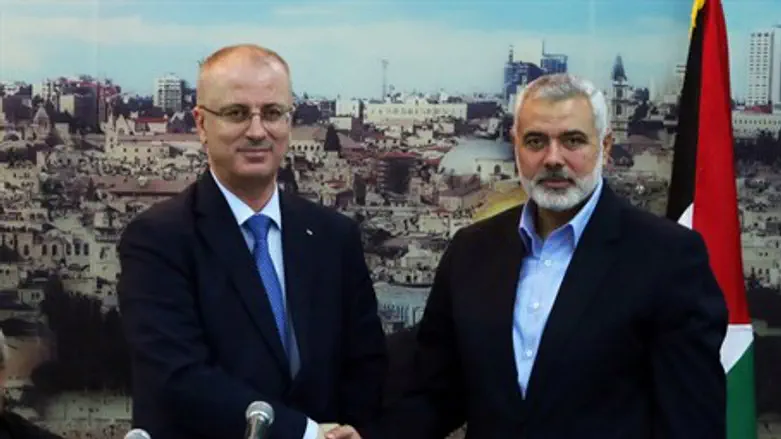
The unity government formed a year ago between the Palestinian Authority's (PA) leading Fatah faction and Hamas has been rocky at best, but a new level of "crisis" occurred earlier this week as unity government ministers say they were held hostage in their Gaza hotel by Hamas.
A unity government delegation of 40 officials, including eight ministers, entered Gaza on Sunday, but left early on Monday after having a falling out with Hamas, the de facto rulers of the region.
Minister of Health Jawad Awwad told the Palestinian Arab Ma'an News Agency that Hamas kept the delegation under guard in a hotel, not letting them out and conversely not letting any visitors in to see them.
"Hamas hindered our work and prevented us from communicating with people and with our friends," said Awwad. "We were not comfortable, and we felt a kind of offense. We were put under pressure. We cannot work under pressure."
Part of the reason for the incident may be the goal of the delegation, which had arrived in Gaza primarily in order to work on the wage dispute that has been a major source of tension between Hamas and Fatah.
Hamas has demanded the unity government pay its 50,000 employees, who were hired in 2007, when the organization violently seized control of Gaza, after having resoundingly won in elections.
Those employees took the place of 70,000 PA employees in Gaza who continue to be paid, and who the unity government insists should return to their posts, with Hamas employees being retained "according to need." It has been estimated that the PA has avoided paying the Hamas salaries, fearing that paying the wages of members of an internationally recognized terrorist group may harm its own international funding.
The unity government delegation had planned to begin registering former PA employees in Gaza on Monday, and intended to continue the work until May 7.
However, Awwad claimed Hamas blocked the registration by not letting the delegation visit the ministry headquarters in Gaza.
"We could not go to the headquarters of ministries because there were rallies and protests," said Awwad.
Likewise, Minister of Religious Affairs Yousif Idies called it "unacceptable and unfathomable" that Hamas "did not allow us to get to the ministry headquarters."
Hamas: it was all the delegation's fault
In response to the charges, Hamas spokesperson Sami Abu Zuhri denied that the ministers were under "siege" in the hotel, claiming it was they who refused to leave and go to the ministry headquarters.
Abu Zuhri went on to say that the decision to leave Gaza was not made by the delegation in response to mistreatment by Hamas. Rather, it was a decision by unity government Prime Minister Rami Hamdallah and was unrelated to Hamas.
He went on to say that the fact that the visit collapsed and the delegation left proved its only goal was to register former PA employees, and was not meant to improve the situation in Gaza after Hamas's last terror war, as Hamdallah had said it would.
While Hamdallah and others tried to play down the seriousness of the incident, Islamic Jihad spokesperson Daoud Shihab, who was present at a meeting with the unity government delegation, spoke of a deepening "crisis."
According to Shihab, the "crisis and the issue is bigger and deeper than the unity government."
The spokesperson of the Gaza-based terrorist group said the problem is that "each side interprets agreement based on personal and factional opinion."
Illustrating the depth of that "crisis" has been a series of assassination attempts and bombings targeting Fatah and Hamas officials both in Gaza as well as Judea and Samaria, in what appears to be a growing resurgence of violent conflict between the two factions.
Trying to strike a positive note, Shihab added that even though the delegation had left, it was not "the end of the line and there are efforts to reach a solution."